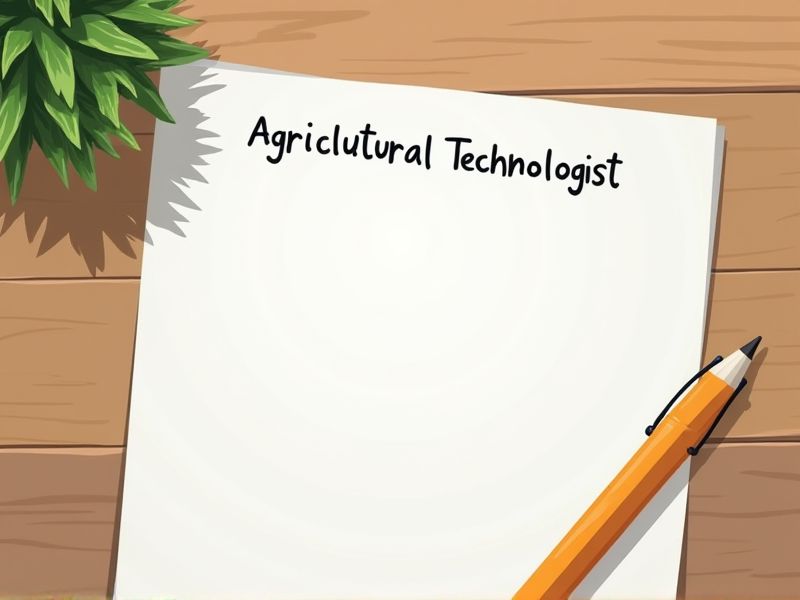
Agricultural Technologists often require specific certifications to establish their credibility and ensure adherence to industry standards. These certifications verify their expertise in implementing advanced technologies and sustainable practices. They also enhance their ability to address complex issues related to soil health, pest management, and crop productivity. Here are important certifications that may be crucial for an Agricultural Technologist.
Certified Crop Adviser (CCA)
Certified Crop Advisers are needed for Agricultural Technologists for several reasons. They provide evidence-based recommendations that can lead to optimized crop yields, which can increase profitability and sustainability. Their expertise helps in integrated pest management, reducing chemical use and environmental impact. They also stay updated with the latest agronomic research, ensuring that technology and practices are at the forefront of agricultural advancements.
Certified Professional Agronomist (CPAg)
Certified Professional Agronomists (CPAg) bring specialized expertise that enhances agricultural production efficiency. Their certification signifies a deep understanding of soil management, crop production, and sustainable farming practices, crucial for Agricultural Technologists aiming to implement effective solutions. CPAgs provide critical insights into optimizing resource use, which can improve yield outcomes and reduce environmental impact. Their professional guidance helps Agricultural Technologists stay updated with advancing agricultural technologies and methodologies.
Integrated Pest Management (IPM) Certification
Pest management in agriculture requires precision and knowledge, and IPM certification provides agricultural technologists with the critical skills and training necessary for effective pest control strategies. This certification emphasizes sustainable practices, reducing reliance on chemical pesticides and thus promoting environmental health and safety. Adopting IPM practices often leads to increased crop yields and improved product quality, which positively impacts a farmer's bottom line. Certification serves as a standardized benchmark of expertise, increasing credibility and marketability for agricultural technologists in the field.
Organic Farming Certification
Organic farming certification is needed for agricultural technologists as it ensures adherence to recognized standards that prioritize environmental sustainability and food safety. This certification aids in protecting ecosystems by encouraging the use of natural methods over synthetic chemicals. With certification, technologists can access specialized markets and provide consumers transparency regarding farming practices. Certification also enhances industry credibility, fostering trust between farmers, consumers, and regulatory bodies.
Fertilizer Applicator Certification
Fertilizer Applicator Certification is needed for Agricultural Technologists because it ensures safe and effective application techniques, minimizing environmental impact and promoting sustainability. Certification establishes a standard of knowledge, requiring individuals to stay informed about the latest advancements and regulations in fertilizer use. This reduces the risk of over-application, which can lead to nutrient runoff and waterway contamination, protecting surrounding ecosystems. Adhering to certification protocols enhances the credibility and trust farmers and the public place in agricultural practices.
Precision Agriculture Certification
Precision Agriculture Certification equips Agricultural Technologists with the necessary skills to handle advanced farming technologies, increasing their efficiency. The certification ensures they can effectively interpret data from innovative tools like GPS and drones, enhancing crop management techniques. It also helps them stay updated with evolving agricultural practices, promoting sustainable farming solutions. Certified technologists tend to attract better job prospects, addressing industry demand for skilled professionals adept at modern agricultural challenges.
Soil Health Management Certification
Soil Health Management Certification equips agricultural technologists with the necessary skills to assess and improve soil conditions, which directly impacts crop productivity. Knowledge from the certification helps technologists implement sustainable practices, reducing the reliance on chemical fertilizers. Certified professionals are better prepared to advise farmers on techniques that enhance soil fertility, leading to healthier crop yields. Organizations and governments often value certified individuals as they can effectively contribute to environmental protection and sustainable agriculture.
Water Resource Management Certification
Water Resource Management Certification equips agricultural technologists with the skills to optimize water usage, directly influencing crop yield and sustainability. Certified professionals are more adept at implementing efficient irrigation techniques, which reduce water waste and lower operational costs. Effective management of water resources helps agricultural technologists mitigate the impacts of climate change on water availability. Certification also enhances credibility and employability in an industry increasingly focused on sustainable and efficient resource use.
GIS for Agriculture Certification
The increasing complexity of agricultural systems requires professionals to utilize advanced tools, and a GIS for Agriculture Certification provides agricultural technologists with essential skills in spatial data analysis. This certification enhances their ability to make data-driven decisions, improving crop management and resource allocation. With climate change impacting agricultural patterns, GIS expertise helps in developing adaptive strategies. The demand for precision agriculture continues to grow, making this certification a valuable asset in the evolving agricultural industry.
Sustainable Agriculture Certification
Sustainable Agriculture Certification equips agricultural technologists with standardized practices that minimize environmental impact, promoting eco-friendly farming techniques. Certified technologists are more likely to implement sustainable practices that improve soil health and preserve biodiversity, contributing to long-term food security. Certification enhances their credibility and marketability, leading to increased trust from clients and employers and potentially higher income opportunities. Understanding sustainable agriculture principles also enables technologists to innovate and adapt in response to climate change and resource scarcity challenges.
Summary
When you, as an Agricultural Technologist, obtain certifications, your expertise becomes more credible and marketable. This enhanced qualification can lead to more job opportunities and potential salary increases. Employers may recognize your certified skills, improving your career advancement prospects. The certifications may also empower you to implement innovative agricultural practices effectively.
